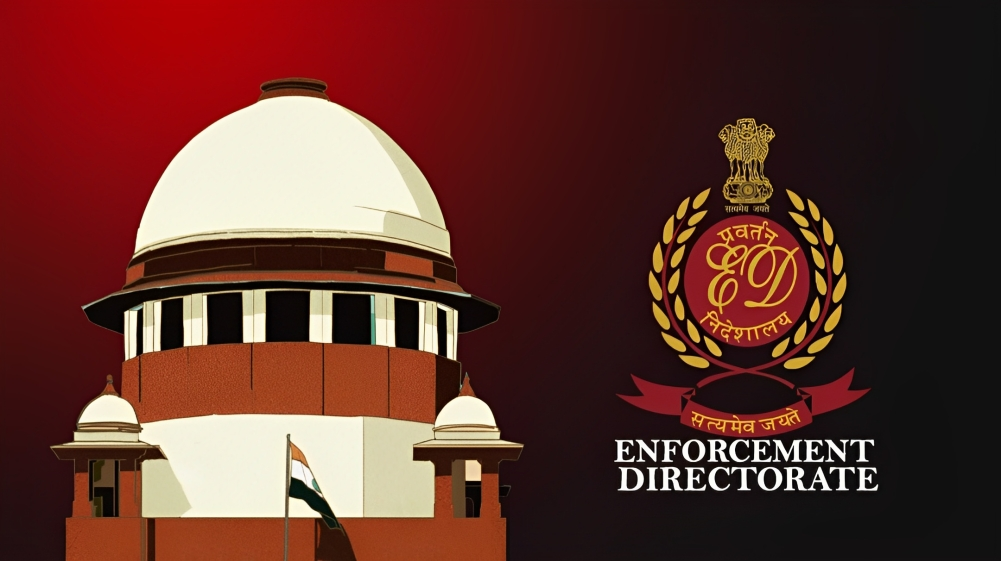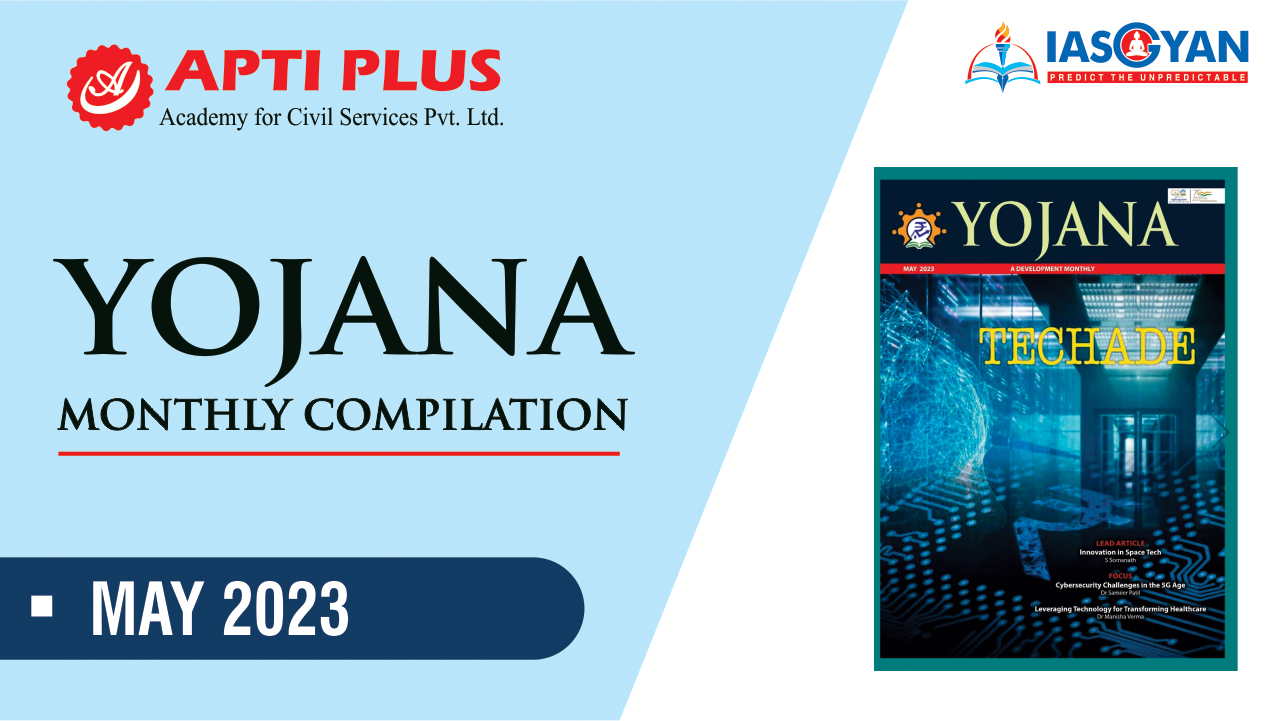 Copyright infringement not intended
Copyright infringement not intended
Context: The Union government stated in the Supreme Court that the current Enforcement Directorate (ED) chief's mandate will not be extended beyond November 2023.
Details
- The Union government gave the present chief of ED a third extension of tenure; however, this decision was challenged in the Supreme Court since it compromised institutional integrity.
- The court had questioned whether the current ED was so "indispensable" to the ED that the government couldn't find another officer to replace him.
- The Union government stated in the court that the current Enforcement Directorate (ED) chief's tenure will not be extended beyond November 2023.
About
- The Enforcement Directorate (ED) is a central agency that investigates economic offences such as money laundering, foreign exchange violations, and hawala transactions. The ED plays a crucial role in combating financial crimes and safeguarding national security and economic interests.
- The ED has been facing a lot of controversies and challenges regarding the tenure of its chief.
Background
- The current chief was appointed in November 2018 for a two-year term, which expired in November 2020.
- However, the central government extended his tenure by one year through an office order, which was challenged in the Supreme Court by an NGO called Common Cause.
- The Supreme Court, in its judgment in 2021, upheld the extension of Mishra's tenure by one year but ruled that no further extensions can be granted to him.
- The court also observed that the ED director should have a fixed tenure of not less than two years, as per the Central Vigilance Commissioner (CVC)
- The central government brought an ordinance to amend the CVC Act, giving itself the power to extend the tenure of the ED director by up to five years, subject to annual extensions. The ordinance was later replaced by an act of parliament.
Criticism
- The amendment to extend the tenure of CVC by the government has been widely criticized and challenged by various petitioners, including former bureaucrats, activists, lawyers, and opposition parties.
- They have argued that the amendment violates the principle of independence and autonomy of the ED and undermines the rule of law and accountability.
- They have also alleged that the amendment is aimed at giving undue advantage to the present Chief of ED.
Why it is important to fix the tenure of the Enforcement Directorate?
- To ensure stability and continuity in the functioning of the agency, this is essential for the effective investigation and prosecution of complex and transnational financial crimes.
- Protect the ED director from political interference and pressure, this may compromise his/her integrity and impartiality.
- To enhance the credibility and reputation of the ED as a professional and independent institution, both nationally and internationally

Enforcement Directorate
Background
- In 1956, Enforcement Directorate was founded as the "Enforcement Unit" within the Department of Economic Affairs under the Ministry of Finance.
- In 1957, it was renamed as "Enforcement Directorate".
- In 1960, its administrative control was transferred to the Department of Revenue.
- Between 1973-77, it was under the Department of Personnel and Administrative Reforms.
- Currently, it is part of the Department of Revenue, the Union Ministry of Finance.
About
- The Enforcement Directorate (ED) is a specialized financial investigation agency under the Ministry of Finance.
- It is responsible for enforcing the provisions of the Prevention of Money Laundering Act, 2002 (PMLA) and the Foreign Exchange Management Act, 1999 (FEMA) in cases of economic offences and cross-border crimes.
- The ED was established in 1956 as a wing of the Department of Revenue to deal with foreign exchange violations under the Foreign Exchange Regulation Act 1947 (FERA). Over the years, it has evolved into a multi-disciplinary agency with expertise in financial intelligence, cyber forensics, legal analysis and international cooperation.
The ED's main functions
- To investigate and prosecute cases of money laundering and related offences under the PMLA.
- To adjudicate cases of contravention of FEMA and impose penalties or confiscate foreign exchange or assets involved.
- To conduct searches, seizures and arrests in connection with its investigations.
- To gather and analyze financial intelligence from various sources and share it with other law enforcement agencies and regulators.
- To cooperate with foreign counterparts in matters of mutual interest and facilitate extradition or deportation of fugitives.
The enforcement Directorate deals with 4 laws
- The Prevention of Money Laundering Act, 2002 (PMLA).
- The Foreign Exchange Management Act, 1999 (FEMA).
- The Fugitive Economic Offenders Act, 2018 (FEOA).
- Conservation of Foreign Exchange and Prevention of Smuggling Activities Act, 1974 (COFEPOSA)
Significance
- The ED plays a vital role in combating economic crimes and safeguarding the national security and economic interests of the country.
- It works closely with other agencies such as the Central Bureau of Investigation (CBI), the Income Tax Department (ITD), the Reserve Bank of India (RBI), the Securities and Exchange Board of India (SEBI), the National Investigation Agency (NIA), the Financial Intelligence Unit (FIU) and the Narcotics Control Bureau (NCB).
- The ED also represents India in various international forums such as the Financial Action Task Force (FATF), the Asia/Pacific Group on Money Laundering (APG) and the G20 Anti-Corruption Working Group.
- It participates in bilateral and multilateral dialogues and joint investigations with foreign agencies on issues related to money laundering, terrorist financing, tax evasion, black money, cybercrime and other cross-border offences.
Challenges
Used as a Political Tool by the ruling party
- One of the main criticisms of the ED is that it is often used as a political tool by the ruling party to target its opponents and critics.
- The ED has been accused of selective and arbitrary enforcement of cases, harassment and intimidation of witnesses and accused, and leaking sensitive information to the media to influence public opinion.
- It raised questions about the independence and impartiality of the ED and its susceptibility to political interference.
Poor track record of conviction and recovery
- Another criticism of the ED is that it has a poor track record of conviction and recovery in its cases.
- According to a report, out of 41,000 cases registered by the ED between 2009 and 2019, only 8,000 were charge-sheeted and only 3,000 resulted in a conviction.
- The report also stated that out of Rs 1.66 lakh crore worth of assets attached by the ED in these cases, only Rs 9,041 crore were confiscated by the courts.
- This shows that the ED has a low success rate in proving its cases and securing justice for the victims of financial crimes.
Lacks adequate resources and manpower
- The ED is that it lacks adequate resources and manpower to deal with the increasing complexity and volume of economic offences.
- The ED has a sanctioned strength of 2,064 officers, but only 961 are in position as of March 2020. This means that there is a vacancy of more than 50% in the agency.
- The ED also faces challenges in obtaining cooperation from foreign jurisdictions, accessing digital evidence, and dealing with new forms of financial crimes such as cryptocurrency and cyber fraud.
-min.jpg)
Steps need to be taken
Strengthening the autonomy
- Strengthening the autonomy and oversight of the ED by creating a statutory body or a parliamentary committee to appoint and supervise its director and other senior officers, and to review its performance and budget.
Enhancing the Professionalism
- Enhancing the professionalism and competence of the ED officers by providing them regular training, incentives, promotions and recognition, and ensuring their security and welfare.
Expanding the infrastructure
- Expanding the infrastructure and network of the ED by establishing more zonal and sub-zonal offices, creating specialised units for different types of cases, and upgrading its equipment and technology.
Improving the coordination and cooperation
- Improving the coordination and cooperation of the ED with other agencies such as CBI, RBI, SEBI, Income Tax Department, etc., as well as with foreign authorities, through information sharing, joint investigations, mutual legal assistance treaties, etc.
Streamlining the legal framework
- Streamlining the legal framework and procedures for economic offences by simplifying and consolidating various laws, reducing delays and pendency in courts, enhancing penalties and deterrents for offenders, etc.
Institutional Integrity
About
- It is the quality of being honest, ethical and accountable in fulfilling one's duties and responsibilities.
- The ED plays a vital role in combating corruption, black money, terrorism financing and other crimes that threaten the national security and economic stability of the country. However, the ED also faces many challenges and risks that can compromise its institutional integrity, such as political interference, lack of autonomy, inadequate resources, operational inefficiencies, internal misconduct and external pressures.
How can the ED ensure its institutional integrity and maintain public trust and confidence in its work?
Strengthening the legal framework and Operational Guidelines
- The ED should have a clear mandate, powers and functions that are defined by law and consistent with international standards and best practices.
- The ED should also have transparent and objective criteria for selecting, prioritizing and pursuing cases, as well as for cooperating with other agencies and jurisdictions.
Enhancing Independence and Accountability
- The ED should be free from any undue influence or interference from any external or internal sources, especially from political or vested interests.
- The ED should also be accountable for its actions and decisions to the Parliament, the judiciary, the media and the public.
- The ED should have effective mechanisms for internal oversight, external audit, performance evaluation and grievance redressal.
Improving the Capacity and Professionalism
- The ED should have adequate human, financial and technical resources to carry out its functions efficiently and effectively.
- The ED should also have a merit-based and transparent system for recruiting, training, motivating and retaining its staff.
- The ED should foster a culture of integrity, competence and excellence among its staff, and enforce a strict code of conduct and ethics.
Building trust and Cooperation with other Stakeholders
- The ED should establish and maintain good relations and communication with other relevant authorities, such as the Central Bureau of Investigation (CBI), the Income Tax Department (ITD), the Reserve Bank of India (RBI), the Financial Intelligence Unit (FIU) and other law enforcement agencies.
- The ED should also engage with civil society organizations, academia, media and international partners to share information, expertise and best practices, as well as to solicit feedback and support.
Raising Awareness and Educating the Public
- The ED should increase its visibility and outreach to inform and educate the public about its mandate, functions and achievements.
- The ED should also highlight the benefits and challenges of its work, as well as the risks and consequences of economic crimes.
- The ED should encourage public participation and cooperation in reporting suspicious transactions, providing evidence and whistleblowing.
Conclusion
- The Enforcement Directorate is a vital agency for safeguarding the economic security and integrity of India. It has done commendable work in exposing and prosecuting many high-profile cases of financial crimes. However, it also needs to address its shortcomings and challenges to become more efficient, effective and accountable. By implementing necessary reforms and improvements, the ED can enhance its credibility and reputation as a professional and independent agency that works for the public interest.
Must Read Articles:
Central Vigilance Commissioner (CVC): https://www.iasgyan.in/daily-current-affairs/central-vigilance-commission-28
|
PRACTICE QUESTION
Q. The Enforcement Directorate (ED) is a central agency that investigates economic offences and money laundering cases. However, it has been criticized for being selective, biased and inefficient in its functioning. How can the ED improve its credibility, accountability and effectiveness in dealing with complex financial crimes?
|

https://epaper.thehindu.com/ccidist-ws/th/th_delhi/issues/35585/OPS/GV3B75G5C.1+GJ4B76AN4.1.html





 Copyright infringement not intended
Copyright infringement not intended




